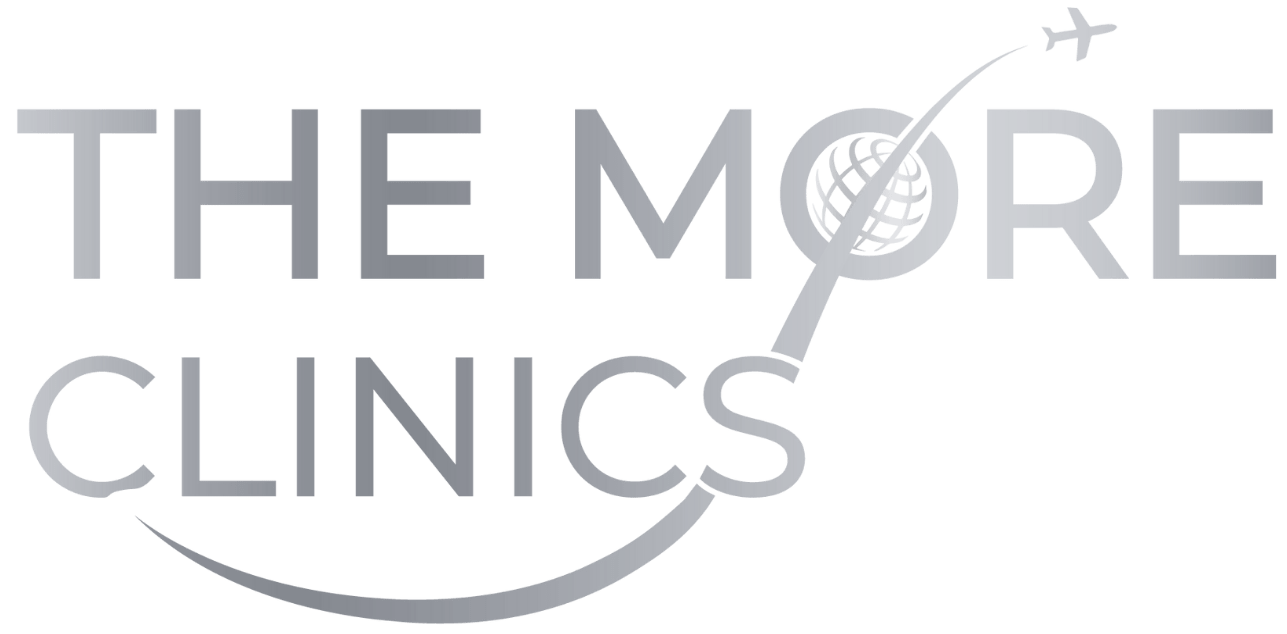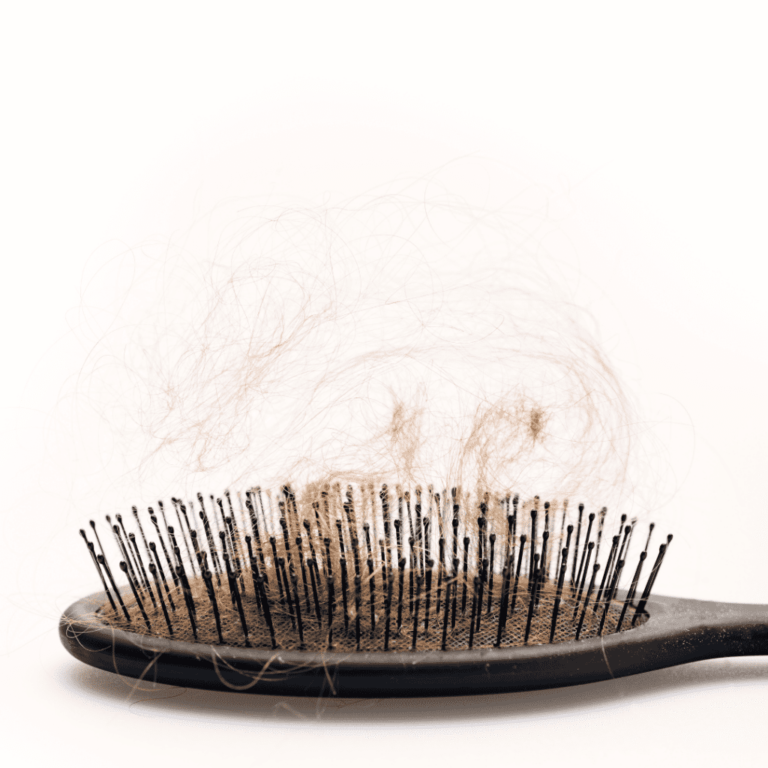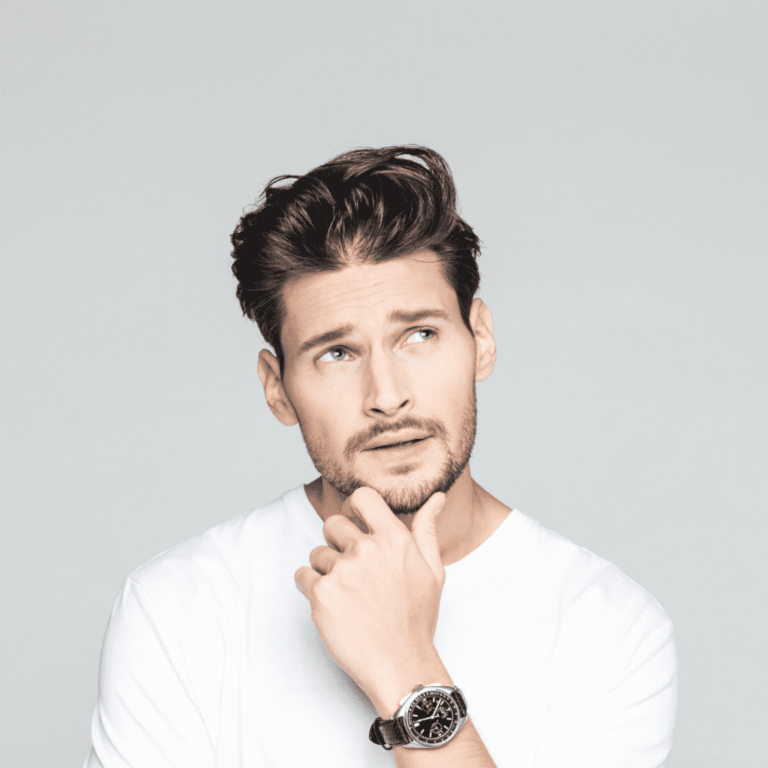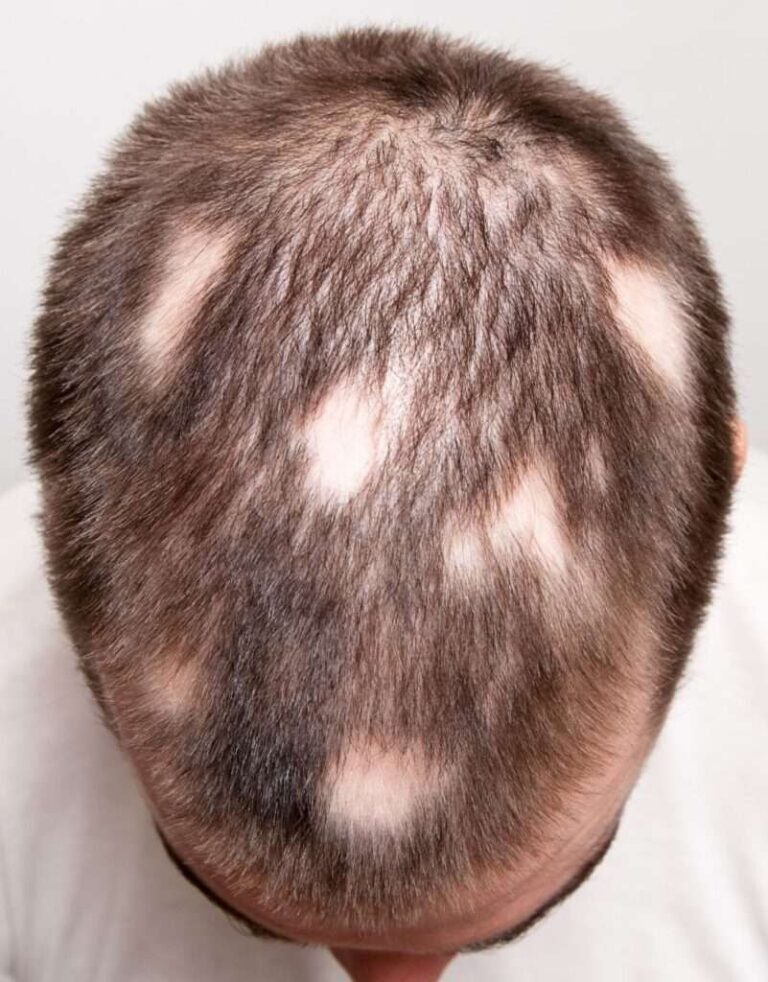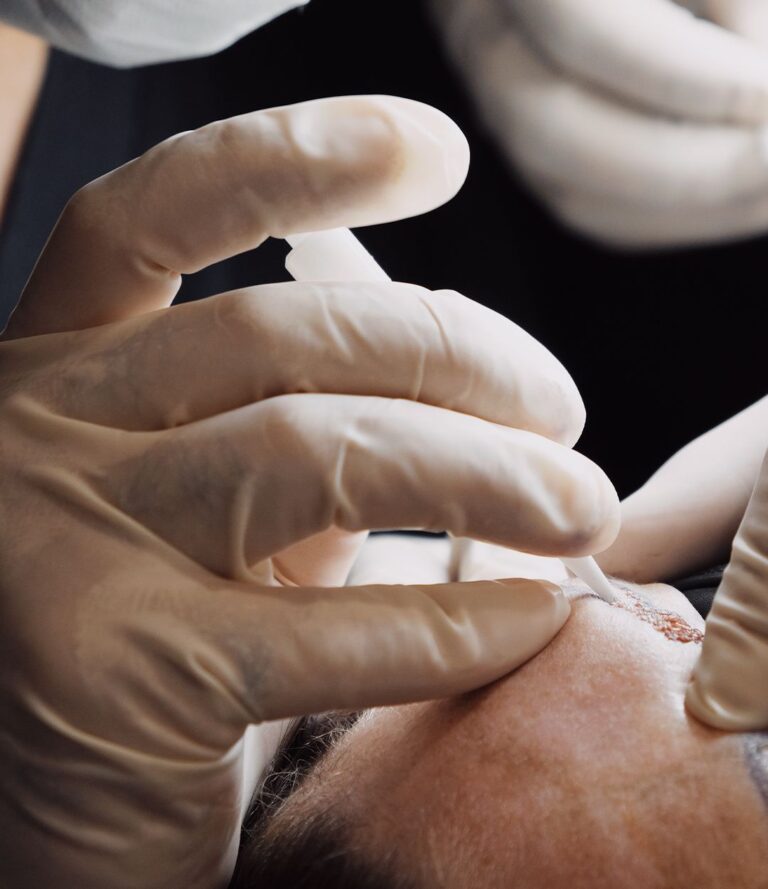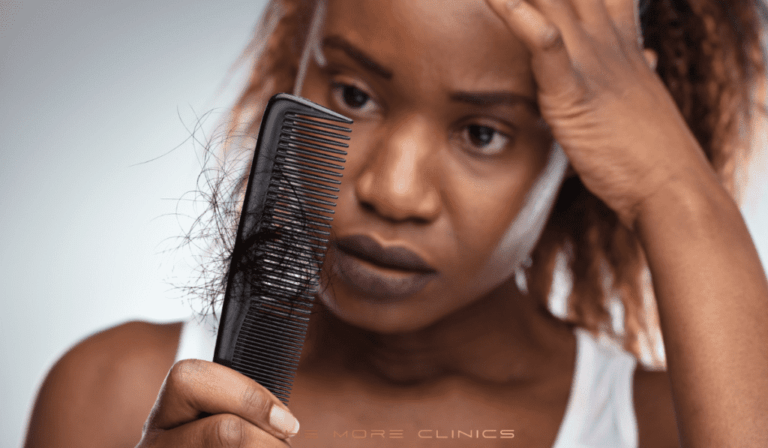Tips to Prevent Hair Loss
Hair loss can be a distressing experience, impacting our self-esteem and confidence. Whether you’re noticing a few extra strands in the shower drain or dealing with a more significant hair loss concern, it’s essential to address it promptly. To effectively combat hair loss, it is crucial to identify and address the root cause.
What is the normal amount of hair to lose per day? The answer is around 100 hairs a day because of the normal growth cycle.
Whether it stems from childbirth, surgery, or other significant stressors, understanding these underlying factors is key. In certain instances, such as with telogen effluvium, hair loss can be temporary. By targeting the source and implementing appropriate measures, we can promote healthier hair growth and restore confidence.
If you notice significant weight loss, it’s important to consult a medical professional, dermatologist, or hair specialist to rule out any potential underlying medical conditions before exploring other options.
In this comprehensive guide, we’ll explore various strategies and tips to help you prevent hair loss and maintain luscious locks.
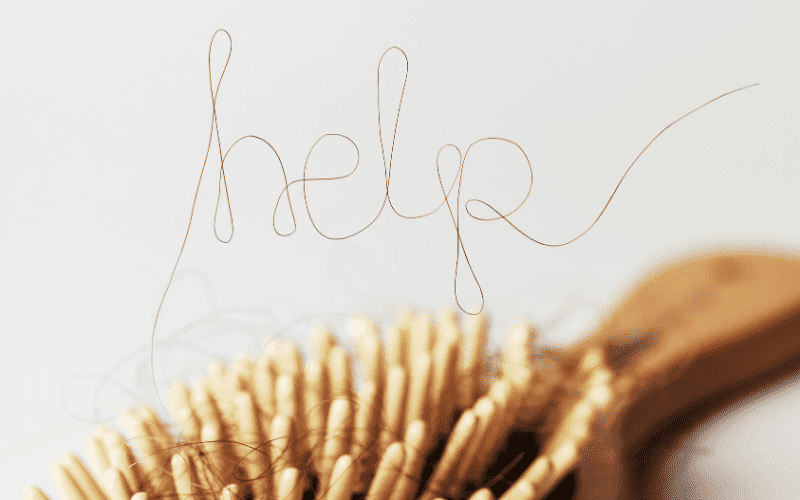
Hair Care
Proper hair care is fundamental in preventing hair loss. Here are some essential tips to keep in mind:
Hair Styling Matters
When it comes to hair styling, how you handle your hair can make a significant difference in preventing hair loss.
It’s crucial to avoid tight hairstyles that pull at the scalp, such as ponytails, braids, or buns, as they can cause tension and breakage. Instead, opt for loose styles that allow your hair to breathe. Excessive tension can lead to a condition known as Traction Alopecia, which is characterized by hair loss.
Be gentle when detangling your hair; use a wide-tooth comb, start from the ends and work your way up to the roots. Moreover, limit the use of heat styling tools and always apply a heat protectant before use.
Regular Washing
Regular washing keeps your scalp clean, removing dirt and excess oil that can clog follicles.
Use mild shampoos and conditioners: Look for products that are sulfate-free and contain natural ingredients.
Be Mindful of Chemical Treatments
Frequent hair coloring, bleaching, perming, and straightening can all contribute to hair loss. These processes involve harmful chemicals that damage the hair shaft and weaken the strands.
Consider using natural alternatives or minimizing these treatments to avoid damaging your mane.
Medical Treatments
Platelet-rich plasma : PRP for Hair Loss
PRP therapy involves drawing blood from your arm, separating the platelets, and then injecting the plasma into your scalp. Rich in growth factors, PRP therapy has shown promise in promoting hair growth, although more research is required to understand its effectiveness fully.
Related Post: Prp for Hair Loss Guide.
Laser Therapy
Low-level laser therapy is a safe form of light/heat treatment under investigation for various health indications.
It is being used to treat the genetic forms of hair loss common in men and women, androgenetic alopecia or pattern balding. Also it is used to treat hair loss due to chemotherapy.
(For more information about: male pattern baldness or female pattern baldness)
Hair Transplant Surgery
Hair transplant surgery is another medical option for combating hair loss. In this procedure, small patches of scalp where hair still grows are removed and then transplanted to balding areas. This can help to fill in areas of thin or absent hair growth.
While this process can be quite effective, it is also more invasive and expensive than some other treatments, and it may not be the right choice for everyone.
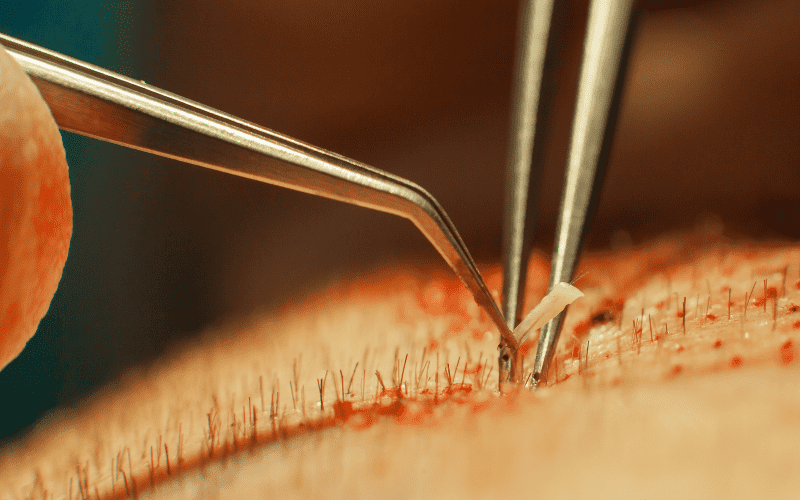
Medications
Minoxidil (Rogaine)
Minoxidil is an over-the-counter medication often recommended for hair loss. It works by prolonging the growth phase of hair, leading to thicker and longer hair growth. While it’s not a permanent solution and can take up to six months to show results, many people report significant improvements from its use.
Finasteride (Propecia)
This is a prescription medication for men, which works by blocking the hormone androgen dihydrotestosterone (DHT), known to contribute to hair loss.
It’s typically taken once a day in pill form. As with Minoxidil, the effects are seen over months, and hair loss will likely resume if the medication is stopped. Women who are pregnant or may become pregnant should not handle finasteride due to the risk of birth defects.
Diet to Prevent Hair Loss
Explore the role of nutrition in hair health. We’ll provide dietary recommendations and highlight essential vitamins and minerals that contribute to stronger, fuller hair.
Following the Mediterranean diet
A diet rich in fruits, vegetables, and lean proteins may contribute to healthier hair.
The Mediterranean diet, in particular, is associated with a lower risk of pattern baldness due to its anti-inflammatory properties. Incorporate healthy fats like olive oil and fatty fish, such as salmon or mackerel, for their omega-3 content.
Protein
Hair is predominantly composed of keratin, a protein that plays a vital role in promoting strong and healthy hair growth. Ensuring an adequate intake of protein is crucial for maintaining the health of your hair. While further studies are required, incorporating a protein-rich diet may potentially help prevent hair loss.
Optimal sources of protein include lean meats, fish, chicken, turkey, legumes, and nuts.
Essential Vitamins and Supplements
Multivitamin: A daily multivitamin can help to fill any nutrient gaps in your diet and promote overall health, including hair health. Look for a multivitamin that contains B vitamins, Vitamin D, and Vitamin E.
Vitamin A : Vitamin A is essential for cell growth, including hair cells. It also helps to produce sebum, a natural oil that moisturizes and nourishes the scalp.
Vitamin D: Vitamin D deficiency has been linked to hair loss, and supplementing with Vitamin D may promote healthy hair growth. Exposure to sunlight is also a natural way to increase levels of this vitamin in the body.
Biotin (Vitamin B7) : Biotin is a water-soluble vitamin that supports healthy hair growth. Its deficiency is linked to hair thinning and loss, making it a popular ingredient in hair growth supplements.
Iron :Iron aids in the production of hemoglobin, which carries oxygen to cells, including those in the scalp. Low iron levels can lead to anemia and contribute to hair loss.
Zinc :Zinc is essential for maintaining healthy hair follicles and promoting cell division. Its deficiency has been linked to hair loss and scalp conditions such as dandruff.
Ginseng: Ginseng is a widely used herbal supplement that has been studied for its potential to promote hair growth and prevent hair loss. While more research is needed, some studies have shown promising results.
Other Methods
Scalp Massage
Massaging your scalp regularly promotes blood circulation, which nourishes the hair follicles and encourages healthy hair growth.
Essential oils
A review in 2020 highlighted the potential benefits of several essential oils, such as chamomile oil, thyme oil, tea tree oil, and others, in improving conditions like alopecia areata, androgenetic alopecia, and psoriatic alopecia.
Related Post : 10 Essential Oils for Hair Growth and How to Use Guide
· Coconut Oil: Coconut oil has been shown to penetrate deep into the hair shaft, preventing protein loss and reducing damage from styling and chemical treatments.
· Olive Oil: Rich in Vitamin E and monounsaturated fatty acids, olive oil helps to moisturize and nourish the hair.
· Argan Oil: This oil is rich in antioxidants and essential fatty acids, making it a popular choice for promoting hair growth and improving overall hair health.
· Rosemary Oil: Rosemary oil has been studied for its potential to promote hair growth and improve scalp health.
· Peppermint Oil: Peppermint oil acts as a vasodilator, promoting blood flow to the scalp and potentially aiding in hair growth.
Other oils such as castor oil, jojoba oil, and almond oil may also have beneficial effects on hair health.
Onion Juice
Onion juice is a traditional remedy that has been gaining traction in the scientific community for its potential benefits in treating alopecia areata, a condition where hair falls out in small patches. A study published in the Journal of Dermatology found that applying onion juice to the scalp twice daily helped to significantly increase hair regrowth in individuals with alopecia areata compared to a tap water solution.
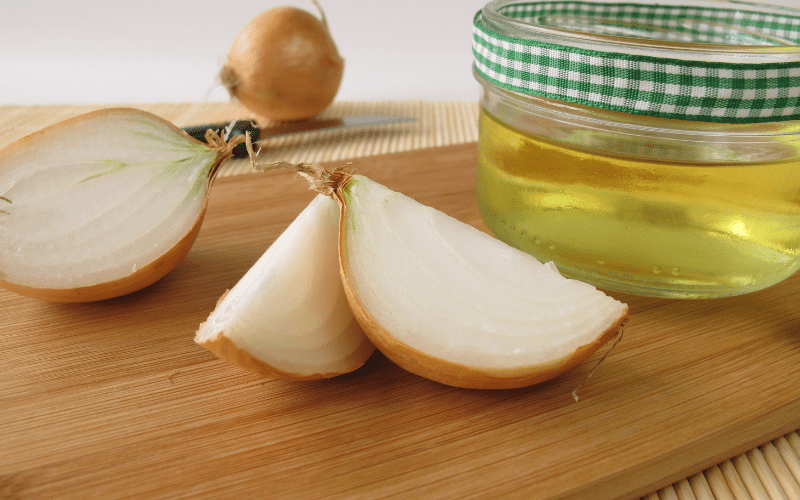
Although more research is needed to fully understand the benefits and effectiveness of onion juice for hair loss, it is a low-risk home treatment that you can try.
Here’s how you can use onion juice for your hair:
1. Peel and chop one onion into pieces.
2. Blend the pieces and squeeze out their juice.
3. Apply the juice to your scalp or the bald patches.
4. Leave it on for at least 15 minutes (longer if you can tolerate the smell) and then wash it off using a mild shampoo.
5. Repeat this process at least twice a week for optimal results.
Please remember, it’s essential to do a patch test before applying onion juice to ensure you don’t have an allergic reaction. Also, the smell of onions can be quite strong, so it’s recommended to rinse thoroughly and use a fragrant conditioner to mitigate the onion odor. As always, consult your doctor or a dermatologist before starting any new treatment regimen.
Yoga
Stress is a well-known contributor to hair loss, and practicing yoga can help reduce stress levels.
Yoga is a mind-body practice that combines physical postures, breathing techniques, and meditation. While it has many benefits for overall health, some yoga poses may specifically improve blood circulation to the scalp and promote hair growth.
These include downward-facing dog pose, headstand pose, camel pose, and others. Incorporating these poses into your daily routine may help to keep your

Why Is My Hair Falling Out?
Hair loss can occur for various reasons, from genetics to lifestyle factors. Common reasons may vary person to person but some reasons include:
· Hormonal Changes: Hormonal changes such as pregnancy, menopause, or thyroid disorders can cause temporary hair loss.
· Genetics: Family history plays a significant role in determining the likelihood of hair loss.
· Medical Conditions and Treatments: Certain medical conditions such as alopecia areata, lupus, and radiation therapy for cancer can cause hair loss.
· Stress: Chronic stress can lead to telogen effluvium, a condition where hair follicles are pushed into a resting state and cause excessive shedding.
· Diet: A diet lacking in essential vitamins and minerals can contribute to hair loss. Additionally, crash diets and restrictive eating habits can also lead to hair loss.
· Hairstyling Practices: Tight hairstyles, excessive heat styling, and chemical treatments can damage the hair shaft and lead to hair breakage and thinning.
Related Posts :
Can My Hair Loss Be Reversed?
While not all forms of hair loss can be completely reversed, many treatments and strategies can stimulate regrowth and prevent further thinning.
Even some types are temporary, and hair may regrow on its own without any treatment. However, if you are experiencing significant hair loss or have concerns about your hair, it’s always best to consult a doctor for proper diagnosis and treatment recommendations.
Related Post: Types of Hair Loss
Frequently Asked Questions
1. Is hair loss permanent?
Hair loss can be temporary or permanent, depending on the underlying cause. Conditions such as telogen effluvium, where stress or illness triggers hair loss, are typically temporary. On the other hand, androgenetic alopecia, or pattern baldness, is a permanent form of hair loss.
2. Do hot showers cause hair loss?
Hot showers can strip the scalp of essential oils, leading to dry, brittle hair that is more prone to breakage. However, they do not cause hair loss directly. It’s more about the health of your hair and less about the loss of hair from the scalp.
3. Can stress cause hair loss?
Yes, stress can cause hair loss. High-stress levels can push hair follicles into a resting phase, causing hair to shed and fall out. This condition is known as telogen effluvium.
4. Does smoking cause hair loss?
Yes, smoking can contribute to hair loss. The toxins in cigarettes can damage hair follicles, and smoking can restrict blood flow to the scalp, depriving hair of the nutrients it needs to grow.
5. Do hair transplants help hair loss?
Yes, hair transplants can help with hair loss. It is a surgical procedure that involves moving hair follicles from a part of the body where hair is plentiful (like the back of the scalp) to a spot that has experienced hair loss.
6. Does caffeine stop hair loss?
Caffeine has been found in some studies to stimulate hair growth when applied topically. It may help to block DHT, a hormone known to cause hair loss. However, drinking caffeine alone is unlikely to stop hair loss.
Last Words from The More Clinics
The key focus is to understand the root cause of hair loss and take appropriate action based on that knowledge. With the right approach or treatment plan and patience, you can take care of your hair and prevent excessive hair loss. Keep in mind that healthy hair is a reflection of overall health, so prioritize self-care and maintain a balanced lifestyle for optimal results.
At The More Clinics, we understand the emotional impact of hair loss and the desire to maintain a healthy head of hair. Our commitment to your well-being extends to helping you prevent hair loss and achieve your hair goals. Contact us to learn more!
GET A FREE CONSULTATION!
Let’s Start Planning Your Treatment %100 Guarantee Results.
Medically Reviewed by Dr. Seda Erdoğan who specialized on Hair Transplants, Dermatology
